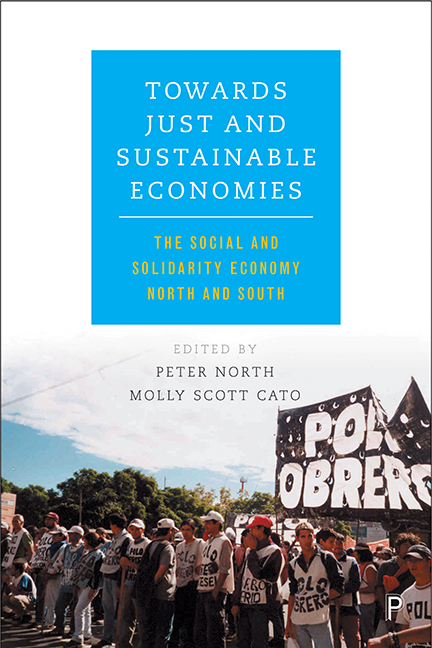Book contents
- Frontmatter
- Dedication
- Contents
- List of figures and tables
- Notes on contributors
- Acknowledgements
- One Introduction: new economies North and South – sharing the transition to a just and sustainable future
- Part I Theoretical perspectives on the social and solidarity economy
- Part II The social and solidarity economy as a site of social innovation
- Part III The social and solidarity economy and the state
- Part IV Policy translation between North and South
- Index
Six - Innovation, cooperatives and inclusive development:rethinking technological change and social inclusion
Published online by Cambridge University Press: 05 April 2022
- Frontmatter
- Dedication
- Contents
- List of figures and tables
- Notes on contributors
- Acknowledgements
- One Introduction: new economies North and South – sharing the transition to a just and sustainable future
- Part I Theoretical perspectives on the social and solidarity economy
- Part II The social and solidarity economy as a site of social innovation
- Part III The social and solidarity economy and the state
- Part IV Policy translation between North and South
- Index
Summary
Introduction
In South America, during the past 10 years, the relations between technological innovation and inclusive development have been stabilised into research and policy agendas. However, our conventional understandings of what constitutes innovation still guide the ideas and practices that are embedded in science and technology public policy. This chapter aims to provide a reconceptualisation of the notion of the innovation and production system in order to foster the social and solidarity economy as a pathway to social and inclusive development.
In particular, the chapter utilises theoretical perspectives to position worker cooperatives as actors providing dynamism to innovation and social development processes. In particular, the goal is to highlight the role of these productive units in the context of science, technology and innovation (STI) public policy. The working hypothesis is that a shift in focus towards worker cooperatives could have the potential to set in motion a series of dynamics of learning, knowledge sharing, and techno-productive capability generation that would entail new sociotechnical alliances oriented to more democratic processes of knowledge acquisition and generation of the associated value.
In that sense, the chapter presents a brief review of the economic literature on the role of the company in terms of innovation, followed by a critical analysis of those principles. From a methodological point of view, the work deploys a conceptual approach that combines theories of the sociology of technology, particularly socio-technical analyses (Thomas, 2008a, 2008b, 2009) and learning economy (Lundvall, 1992). From this framework, the chapter provides an explanation of the systemic implications of an innovation and production system focused on the profit-maximising company vis-à-vis a system focused on worker cooperatives. Finally, the chapter closes with a series of reflections on STI public policies aimed at inclusive development.
Economy, technology, and development: from theory to the implications for analysis
Various schools of economic thought, at different points in history, have assigned a diverse set of meanings and signifiers to the technological dimension of economic development: ‘technical progress’, the ‘development of productive forces’, ‘modification of technique’, ‘technological change’ and ‘innovation’, among others. In this chapter, technology is understood as artefacts, processes and methods of organisation. Technology, in its various manifestations, has been a key aspect in the development of economic theory.
- Type
- Chapter
- Information
- Towards Just and Sustainable EconomiesThe Social and Solidarity Economy North and South, pp. 99 - 116Publisher: Bristol University PressPrint publication year: 2017

